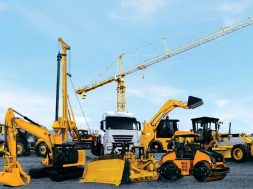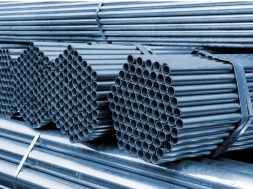Construction equipment rental market

The construction equipment rental market is expanding rapidly, driven by rising demand for cost-effective equipment solutions, increased construction activity, and a shift to rental models for equipment acquisition.
As construction projects become increasingly diversified and dynamic, the rental market offers access to a wide choice of specialised equipment adapted to individual project needs. According to Persistence Market Research, the construction equipment rental market consists of leasing heavy machinery, tools, and vehicles on a short- or long-term basis, providing contractors and construction businesses with flexibility, scalability, and cost savings over outright purchases.
Market Growth Factors:
Cost-Effectiveness and Flexibility: Renting construction equipment reduces the need for huge initial investments, maintenance fees, and storage costs, allowing enterprises to better allocate resources and focus on project execution. Furthermore, rental agreements allow you to scale equipment usage depending on project schedules, seasonal changes, and changing job requirements, assuring maximum resource utilisation and project efficiency.
Rising Construction Activities: The growing need for construction services, along with the necessity to meet project timelines, is driving demand for construction equipment rental as contractors seek access to a wide fleet of machines to support project requirements. Rental firms provide a comprehensive selection of equipment alternatives, such as excavators, bulldozers, cranes, loaders, and aerial work platforms, to meet the diverse needs of construction projects across numerous sectors.
Short-Term Projects and Seasonal Demand: Construction equipment rental is a cost-effective way for contractors to obtain equipment for certain project phases, temporary assignments, or high-demand periods without committing to long-term ownership. Rental firms provide contractors with various rental terms, hourly rates, and lease alternatives to accommodate short-term projects, emergency repairs, and temporary equipment demands, allowing them to successfully optimise project costs and resources.
Technological Advancements in Equipment: Rental firms are investing in modernising their fleets with smart machinery that includes telematics, GPS tracking, remote monitoring, and fuel-efficient engines to improve equipment performance and safety. Rental agreements provide contractors with access to the most recent equipment models and technological breakthroughs, allowing them to harness cutting-edge equipment capabilities without incurring the entire expense of ownership or upkeep.
Focus on Equipment Maintenance and Service: Rental firms prioritise equipment maintenance, repair, and inspection to maintain peak performance, safety, and regulatory compliance. Preventive maintenance programmes, frequent inspections, and prompt repairs are critical for extending equipment life, reducing downtime, and increasing productivity on construction sites. Contractors rely on rental firms that provide dependable equipment, prompt customer service, and complete maintenance services to effectively meet project timelines and specifications.
Environmental and Sustainability Considerations: Rental firms are increasing their fleets with environmentally friendly equipment options, such as electric-powered gear, hybrid cars, and fuel-efficient models, in response to client demand for sustainable building methods and regulatory compliance. Contractors looking to reduce carbon emissions and environmental effects and achieve sustainability goals choose to rent eco-friendly equipment from rental companies that promote sustainable building methods.
Market Consolidation and Partnerships: Consolidation allows rental companies to take advantage of economies of scale, improve operational efficiencies, and engage in fleet expansion, technological upgrades, and geographic expansion projects. Partnerships with equipment manufacturers, dealerships, and technology providers give rental organisations access to the most recent equipment models, aftermarket support services, and creative solutions to meet changing client needs and market demands.
Market Opportunities:
Technology integration: Telematics, IoT (Internet of Things), GPS tracking, and equipment management software can all help equipment rental companies optimise fleet utilisation, monitor equipment performance, track repair schedules, and increase operational efficiency.
Rental markets and digital platforms: The rise of online rental markets and digital platforms for equipment rental enables frictionless transactions, increases visibility, and broadens market reach for equipment rental providers. Contractors can use online platforms to browse equipment inventory, compare rental rates, verify availability, and conveniently schedule equipment deliveries or pickups, increasing efficiency and client satisfaction.
Demand for sustainable equipment solutions: Equipment rental firms may capitalise on eco-friendly trends by providing energy-efficient, low-emission, and environmentally friendly equipment options, such as electric-powered machinery, hybrid equipment, and fuel-efficient models, to help construction projects and clients reach their sustainability goals.
Expansion into emerging economies: As building activity, urbanisation, infrastructure development, and industrialisation increase, emerging economies in Asia-Pacific, Latin America, and Africa provide major growth potential for construction equipment rental companies. Expansion into new areas necessitates strategic alliances, local market knowledge, and customised rental solutions tailored to the unique demands and tastes of these regions’ clients.
Diversification of rental services: Value-added services like equipment training, operator certification, safety consultation, project management support, and equipment finance can help rental companies increase customer happiness, retention, and loyalty while also generating new revenue streams.
Market Trends:
Shift towards the rental model: Due to various benefits such as cost-effectiveness, flexibility, and access to cutting-edge technology, more construction organisations and contractors are choosing equipment rental over outright purchase. Renting equipment enables firms to better manage cash flow, reduce maintenance costs, and scale operations up and down based on project needs.
Growing construction activities: The increase in building activity drives up demand for construction equipment rental as businesses strive to manage equipment utilisation efficiently while meeting project deadlines.
Demand for specialised equipment: Construction projects frequently necessitate the use of specialised equipment and machinery designed for specific tasks such as excavation, lifting, material handling, and demolition. Equipment rental firms are expanding their fleets to include a variety of specialised equipment to meet the different needs of their customers and gain a competitive advantage.
Rise in equipment rental platforms: Due to digitalisation and technological improvements, online platforms and mobile applications that include features like equipment availability tracking, online reservations, real-time pricing, and delivery schedules, improve the overall rental experience for both parties.
Focus on equipment maintenance and service: To enhance customer happiness and maximise equipment utilisation, equipment rental businesses are emphasising equipment maintenance, servicing, and uptime. Regular maintenance schedules, equipment inspections, and rapid repair services are critical for reducing downtime while also assuring the reliability and safety of rental equipment.
Market Challenges:
Capital intensive: Despite the advantages of equipment leasing, building and sustaining a rental fleet necessitates a large capital commitment in purchasing, repairing, and replacing equipment. Equipment rental companies must carefully manage their capital expenditures, financing arrangements, and equipment lifecycle expenses to remain profitable and competitive in the market.
Competition and pricing pressures: Intense competition can result in pricing pressures, margin erosion, and the need for differentiation through value-added services, equipment availability, and customer service.
Regulatory compliance and safety standards: Equipment rental firms must adhere to strict regulatory regulations and safety standards that standardise equipment operation, maintenance, and rental practices. Assuring equipment compliance with industry regulations, providing operator training, and following safety protocols are critical to reducing liability risks and assuring customer safety.
Equipment utilisation and seasonality: Optimising equipment deployment, providing flexible rental periods, and diversifying into adjacent markets or industries can help reduce the impact of seasonal changes and ensure consistent revenue streams throughout the year.
Logistics and transportation: In the construction equipment rental business, logistics and transportation are critical since equipment must be delivered to and recovered from job sites on time and at a reasonable cost. Efficient fleet management, route optimisation, and collaboration with logistics partners are critical for lowering transportation costs and assuring on-time equipment availability.
Market Outlook:
The construction equipment rental market is likely to rise further as building activities expand globally and businesses increasingly recognise the advantages of equipment leasing over ownership. Technological improvements, digitalisation, and the rise of online rental platforms will drive market innovation and enhance the rental experience for clients. Despite obstacles such as competition, pricing pressures, and regulatory compliance, equipment rental companies that adapt to market dynamics, prioritise customer service, and invest in fleet optimisation and maintenance will be well-positioned to capitalise on growth opportunities in the construction equipment rental industry.
34
Cookie Consent
We use cookies to personalize your experience. By continuing to visit this website you agree to our Terms & Conditions, Privacy Policy and Cookie Policy.









